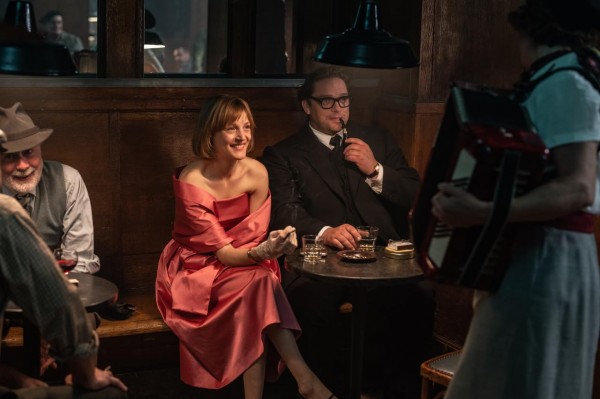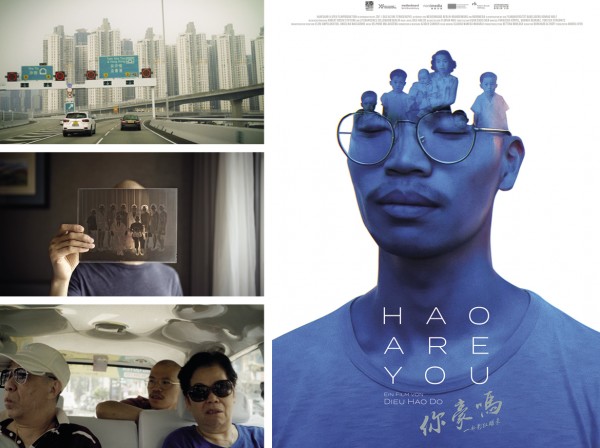MARGARETHE VON TROTTA: INGEBORG BACHMAN: JOURNEY INTO THE DESERT (2023)
VICKY KRIEPS AND RONALD ZEHRFELD IN INGEBORG BACHMAN: JOURNEY INTO THE DESERTS
Portrait of a major Austrian 20th-century literary figure excels in externals but lacks deep conviction
Letterboxed comment says "Ingeborg Bachmann was one of the most brilliant writers of the 20th century and one of the most important poets in the German language. Hardly any other author has played so radically with language and relentlessly illuminated personal abysses. Margarethe von Trotta degrades the artist to a pale blonde in the midst of a banal jealousy farce.... Krieps, one of the rising stars of European cinema, plays Bachmann with an expressionlessness as if she were rehearsing for a Buster Keaton portrait."
A TLS article on the 50th anniversary of her death in Oct. 2023 says that "Despite her extraordinary fame in the postwar years in Germany, much about [Bachman] remains mysterious."This film may be seen as a patchwork built up out of those recent discoveries, with added emphasis on the writer's love of Rome, where she lived much of her life, and her longing for the desert. That she died an alcoholic and barbiturate addict following setting fire to herself and suffering serious burns, at 47, is left out, while the film hihts that she died a Harry Crosby-style "sun death into sun" fading into the heat of the desert. She died in Rome. The main focus holding together the film is her four-year liaison with the Swiss playwright Max Frisch (Andorra, Homo Faber), whom the actor playing him here, an assured, hefty Ronald Zehrfeld, closely resembles; but his role here is what turns the film into what the Letterboxd reviewer calls a "banal jealousy farce."Nonetheless, recent years have revealed considerably more about her life, particularly with regard to her many intimate relationships. The publication in 2004 of her correspondence with the German composer Hans Werner Henze (Basil Eidenbenz), shed light on her longest and closest friendship, while the publication in 2008 of her letters to and from Paul Celan revealed their love affair in the 1950s as foundational to their growth and later success as poets. Last year’s publication of her correspondence with Max Frisch (reviewed in the TLS, 2023) went even further, revising the standard portrait of Bachmann as a helpless victim of Frisch’s cold-hearted abandonment in 1962 by making clear how she also sabotaged their fitful four-year relationship through other love affairs and constant travel.
It's not just that. There was the trouble of two ambitious and famous writers consuming too much oxygen in the room for the other to survive and be creative. Here the clatter of the one-finger typing by Frisch on his olivetti typewriter drives Bachman nuts; then after she burns his diary full of observations about her, which she feels turns her into a laboratory specimen, destroyed his freedom to write. Meanwhile she was constantly traveling and involved with other men, such as the Italian war poet and literary star Giuseppe Ungaretti (Renato Carpentieri) in Rome, and the composer and collaborator Heinz Werner Henze (Basil Eidenbenz) and the wwriter Adoph Opel (Tobias Resch), the young Viennese writer and filmmaker with whom she traveled to Egypt and to the desert and shared at least one scene of group polyamory with two beautiful young Arab men (Sallar Othman, Abudy Ary).
As Bachman Vicky Krieps may look right. She's certainly well dressed. But it's hard to conceive her as the kind of intellectual Ingeborg Bachman was, and apart from that, comments that people adored Bachman's voice at readings and recitations of her work sound odd when we hear Krieps' thin, reedy tones. Reports are the real Bachman's vocal equipment was strong and resonant, and doubtless her reading technique dramatic, rhythmic, compelling. The dramatized public readings that occur periodically in the film fall flat and one is surprised when the end with standing ovations.
Some not-too-critical viewers looking for the dramatization of famous European midcentury cultural figures may be satisfied by this film. The flats people live, meet, and squabble in are truly inviting - as are the costumes, especially Ingeborg's handsome frocks and necklaces; even the rotary telephones are fun and nostalgic to look at. There are scenes of driving through a lovely Swiss landscape in a black VW Bug; Roman interiors are grand and worthy.
The editing of the film applies a chronological cut-up technique: events are presented out of order, rearranged. Intriguing at first, this structure winds up dampening the tension. Superficial aspects of the film are fine. It's the deep underpinning that seems lacking, and this explains why some well-informed local critics expressed profound disappointment. So the jury is dubious about this one.
Ingeborg Bachman: Journey into the Desert/Ingeborg Bachman: Reise in die Wüste , 111 mins., debuted at the Berlinale Feb. 19, 2023; also showed at HongKong, Istanbul, Beijing, Seattle, Shanghai, Zurich, and other international festivals. Screened for this review as part of the 28th Berlin & Beyond Film Festival, presented by the Goethe-Institut San Francisco, will run April 18-20, 2024 at the historic Roxie Theater in San Francisco's Mission District, and April 21-22, 2024 at Rialto Cinemas Elmwood in Berkeley.
Showtimes:
Apr. 20, 2024 at 6:30 PM – Roxie Theater, San Francisco
April 22, 2024 at 7:45 PM – Rialto Cinemas Elmwood, Berkeley





 Reply With Quote
Reply With Quote


Bookmarks